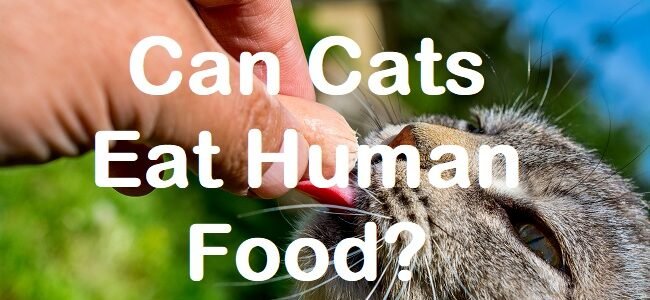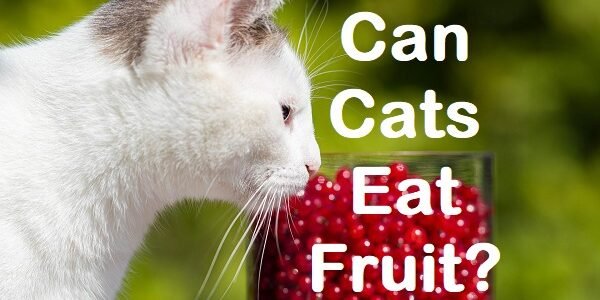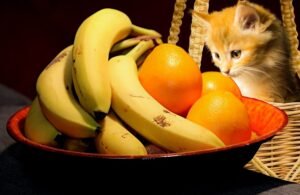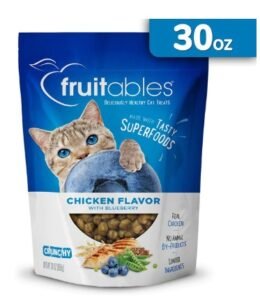The urge to toss a morsel of your favorite food to your cats can be overwhelming. Your cat’s affection could motivate you to share that sandwich with your feline friend. But can cats eat human food?
If you are pondering this, our guide will help you know what human food cats can eat and the foods you must avoid sharing with them.
Can Cats Eat Human Food? Is It Safe For Cats?
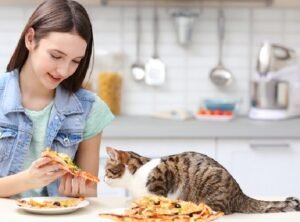 Human foods are not meant for cats. Although some human foods are harmless to cats, others pose a serious risk to your cat’s health.
Human foods are not meant for cats. Although some human foods are harmless to cats, others pose a serious risk to your cat’s health.
A simple taste of some human food could be life-threatening for your cat. Generally, cats require complete and balanced cat food. Therefore, human food should serve as occasional cat treats and not form your cat’s main diet.
Human foods that are safe for cats
The following human foods are safe for cats:
1. Meats
Meats such as beef, chicken, liver, turkey, and lamb are safe for your cats. You must also ensure the meat is cooked as raw meat is known to carry parasites and bacteria that could affect your cat’s health.
2. Fish
Fish are an excellent source of omega-3 fatty acids, which are suitable for your cat’s overall health. Cats are attracted to fish, so serving them as occasional treats is not harmful to their health.
However, ensure it is well cooked, and do not forget to remove bone particles from it before feeding your cat. Like meats, avoid feeding your cats fresh fish as they may carry harmful bacteria.
Note: Some cats do not do well to be fed too much fish. We have published an article that discusses fish allergies in cats.
3. Vegetables
Although cats are obligate carnivores, they can still benefit from plant-based food in their diet. Vegetables contain high amounts of vitamins, fiber, and water, so feeding them to cats is not bad.
You can give your cats some safe vegetables such as peas, carrots, asparagus, cucumber, and steamed broccoli.
4. Whole grains
Some cat owners consider grains as just fillers. However, grains are a rich source of fiber, vitamins, minerals, and essential fatty acids.
Some grains also provide readily digestible protein. Although cats are natural carnivores, their digestive system can process carbohydrates from grains.
Whole grains, including corn, oat, and brown rice, contain a good amount of protein and are safe for cats to eat.
It is not a requirement that cats should eat grain for the added fiber. Cats get all the fiber they need from meat.
5. Eggs
Cats can enjoy a morsel of scrambled or boiled egg. Eggs are packed with amino acids and protein, making them a healthy treat for your cats. However, avoid feeding your cat raw eggs as they pose a risk of Salmonella infection.
6. Fruits
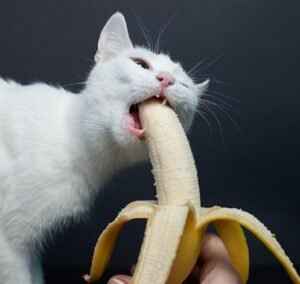 The chances that cats may enjoy a fruit meal varies. Cats have very limited sweet taste receptors, so not all cats may enjoy eating fruits.
The chances that cats may enjoy a fruit meal varies. Cats have very limited sweet taste receptors, so not all cats may enjoy eating fruits.
However, if your cat is attracted to fruits, quite a few are helpful to them. They include bananas, blueberries, strawberries, apples, watermelons, and pumpkins.
Fruits are a rich source of vitamin A and C, potassium, and fiber. However, most fruits contain a high amount of sugar. Because of this, you should feed them to your cats in moderation. Permanently remove peels and seeds from the fruits before feeding them to your cats.
We have a full article devoted to this question: Can Cats Eat Fruit?
Fruitables sells a tasty, low calorie, crunchy cat treat with a recipe to include superfruits.
7. Cheese
Most cats are lactose intolerant, meaning they lack the enzyme that helps process lactose. Although cheese is a dairy product, you can use them as occasional treats for your cats.
Human foods to give with caution
· Potatoes
Some cat food manufacturers add potatoes to their products. This is because potatoes are a rich source of potassium, vitamin B, and C.
The drawback of potatoes is that it contains solanine which is toxic to cats. However, solanine fades away when cooking, so you can feed your cats moderate amounts of this veggie. Avoid constantly serving your cat fried potatoes because of their high-fat content.
· Avocadoes
Avocadoes harm some animals, including poultry, rabbit, and goats. Although no evidence suggests avocado is detrimental to your cats, you should feed them in only moderate amounts.
· Tomatoes
The skin and leaves of tomatoes contain solanine which is toxic to cats. If you must include tomatoes in your cat’s diet, ensure it is fully ripe.
· Peaches
You can give your cat a small portion of peach, as too much of it can cause stomach upset and diarrhea. Peaches contain high amounts of sugar and are pretty difficult to digest, so you must feed your cat cautiously.
· Bread
You can safely feed your cat’s small amount of bread. However, the raw uncooked dough is harmful to your cat, so you must avoid it.
· Peanut butter
Although peanut butter packs high amounts of protein, you should give it to your cat in small quantities. Peanut butter is high in fats which can contribute to diabetes and obesity in cats.
· Tuna Fish
Tuna fish serves as a great source of protein for cats. Tuna contains high amounts of unsaturated fat, so you must feed your cats in minimal amounts. So can cats eat canned tuna meant for humans? We have devoted a whole article to this question HERE.
Human foods you should avoid when feeding your cats
Some human food contains toxins that could be harmful to cats.
1. Grapes and raisins
Grapes are well known to cause gastrointestinal and kidney issues in dogs. Although no concrete evidence supports that these fruits have the same effect on cats, it is better to err on the side of caution.
2. Cherries
The parts of cherries, including pits, stems, and leaves, are poisonous to cats.
3. Oranges
Orange seeds, stems, and leaves are toxic to cats. Similarly, citrus fruits like grapefruits, lime, and lemons are acidic and can disturb your cat’s digestive system.
4. Onions
Onions are toxic to cats, so you should avoid them in your cat’s diet.
5. Milk
Most cats are lactose intolerant as they lack the enzymes in their digestive system to digest it. Some common symptoms of drinking milk in lactose-intolerant cats are vomiting, diarrhea, and liver problems. Learn more about ‘Can Cats Drink Cows Milk?’ HERE.
6. Chocolate
 Chocolate contains theobromine and caffeine, which is harmful to your cats.
Chocolate contains theobromine and caffeine, which is harmful to your cats.
Unlike humans, cats are unable to easily metabolize (break down) theobromine, which leads to a build-up of the substance leading to fatal consequences. The darker the chocolate, the more it contains theobromine.
Learn more about why chocolate is bad for cats HERE.
7. Alcohol
Alcohol and cats do not mix. Therefore, ensure you keep all alcohol products far from the reach of cats.
Can Cats Eat Human Food? Final Thoughts
Can cats eat human food? The short answer is; yes in moderation, however, there some foods to avoid sharing with them.
Not all human food is harmful to cats. But others, such as chocolates and grapes, can be toxic to them.
Contact your veterinarian immediately if you discover your cat has eaten toxic human food. Do not forget that human food should be given as occasional treats to your cats and not as an essential part of their diet.

